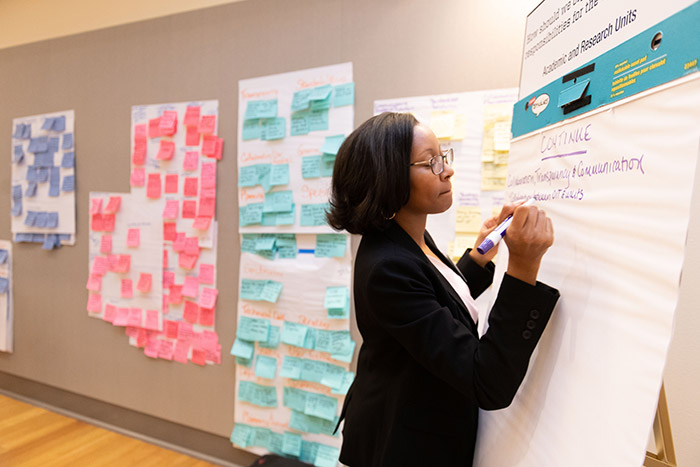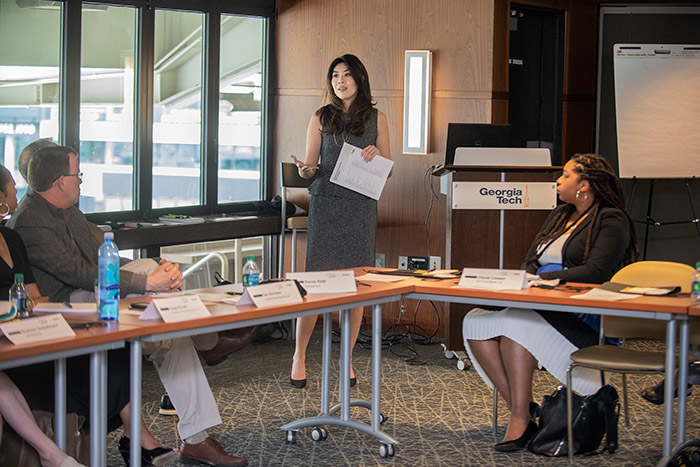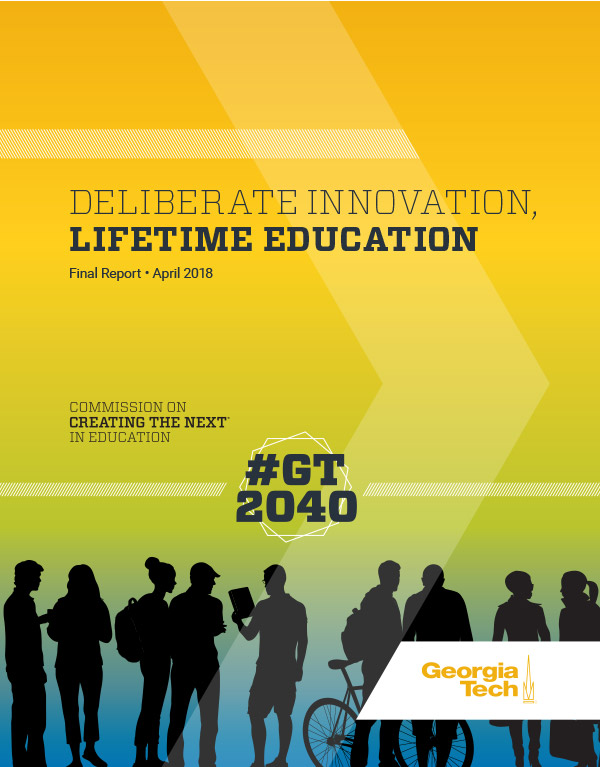
Annual Report 2019: Strategy in Action
In the past year, advances related to the Institute’s 25-Year Strategic Plan, launched back in 2010, were steady and varied, with significant headway made on initiatives such as Creating the Next in Education; a Comprehensive Administrative Review, the University System of Georgia’s program to assist all universities within its system in improving efficiencies. Progress on all these fronts bodes well for the future that is envisioned for Georgia Tech in time for its 150th anniversary in 2035.
Building a Solid Foundation for Creating the Next in Education
Building a Solid Foundation for Creating the Next in Education
The 2018-19 academic year was foundational for Georgia Tech’s Commission on Creating the Next in Education (CNE). The Institute-wide Commission, composed of more than 50 faculty members, staff, and students, is focused on fostering a vision for a nimble, innovative, and global Georgia Tech that cultivates engagement in learners from kindergarten through the rest of their lives.
After the launch of the Commission’s 2018 Deliberate Innovation, Lifetime Education report, the Office of the Provost began designing a long-term strategy that would enable the Commission to bring its powerful vision to life. To that end, the provost established a functional CNE Program Office in the Center for 21st Century Universities (C21U).
Led by Rich DeMillo, executive director of C21U, the CNE Program Office immediately began organizing the staffing and resources required to support the Commission’s long-term success. In partnership with Georgia Tech Strategic Consulting, the CNE Program Office initially focused on formalizing a portfolio of more than 60 affiliated projects and building a community of practice to address key aspects of the CNE Report: developing an immersive culture of deliberate innovation and realizing the Georgia Tech commitment to lifetime education.
With that in mind, Georgia Tech’s Center for Deliberate Innovation, a science-based, cohort-driven, experiential learning environment for highly innovative teams, sponsored Spring 2019 deliberate innovation workshops in conjunction with the CNE Program Office to better equip the innovative capacity of a growing number of Tech faculty members.
With regard to realizing the Tech commitment to lifetime education, Georgia Tech’s Center for Education Integrating Science, Mathematics, and Computing (CEISMC), which is nationally reputed for increasing STEM achievement in K-12 education, was reorganized. It is now a center within C21U. CEISMC directly connects the CNE Program Office to K-12 education through research, outreach, and teacher professional development. This change reflects the aspiration for lifelong learning outlined in the CNE Report and further aligns both C21U and CEISMC with the future-oriented vision of the Institute’s Strategic Plan. CEISMC programs annually impact more than 39,000 students, 1,720 teachers, 74 school districts, and 200 schools.
Other CNE projects are also underway. A redesign of for-credit offerings to facilitate flexible on-ramps and more agile programs of study is well along a path to widespread availability. “Advising for a New Era” projects aimed at more effective guidance for all Georgia Tech learners are changing the face of student advising. Artificial intelligence tools to support learning are now available to a broad cross-section of students. Blockchain certificates are now available and can be used instead of paper certificates to document training and levels of mastery. And a prototype of the Georgia Tech atrium™ will be launched in 2019-20, creating opportunities for learners of all ages to explore next-generation services and new learning experiences.
In summarizing his sentiments on the Commission’s efforts, Provost and Executive Vice President for Academic Affairs Rafael L. Bras said, “Georgia Tech is known for innovative engineering and design, supported by data-driven decision-making and thorough scientific methodology. That is why the CNE Program Office has taken this same approach in its design of support systems for both institutional culture change and practical implementation of the Commission’s vision.”
Comprehensive Administrative Review to Enhance Institute’s Efficiency

Employees contributed ideas during a Collaborative Solution Workshop, as part of the Comprehensive Administrative Review process at Tech.
Comprehensive Administrative Review to Enhance Institute’s Efficiency
In an effort to improve administrative service delivery and redirect savings to student instruction and support, Georgia Tech has been developing an action plan for the University System of Georgia (USG)’s Comprehensive Administrative Review (CAR). Sonia Alvarez-Robinson, executive director of Strategic Consulting, has been facilitating the process, working alongside Institute and USG leaders to outline Georgia Tech’s phased approach to address the following administrative functions: information technology, human resources, budget/finance, and communications.
To that end, the CAR Working Group has collected a great deal of information to inform the CAR Action Plan, with the Georgia Tech values serving as the starting point and highlighting our commitment to cultivating character and preserving public trust.
The CAR data has provided insight about how administrative services have been delivered and experienced across the campus. The Working Group met several times with leaders of the four functional areas — information technology, human resources, budget/finance, and communications — and Collaborative Workshops were used as a means of providing input to the Working Group about ideas for organizing the work more efficiently. During these large group discussions, those who perform the work in the four areas came together and shared suggested solutions. Faculty roundtables also provided robust discussion about opportunities for improvement and generated some additional ideas about making enhancements. In addition, units and individuals provided suggestions for how to advance our administrative processes.
This multi-pronged assessment revealed that there are many opportunities to improve administrative services through better coordination, cooperation, and consistency. The plan, therefore, is to move toward an operating model for these four administrative services that better utilizes central units to foster organizational excellence across the Institute. Additionally, across the Institute, interdependent enterprise efforts to improve organizational effectiveness are underway, including projects such as the implementation of ServiceNow, Workday, and OneUSG Connect.
Survey Provides Clarity for Shaping Ethical Campus Culture

Ling-Ling Nie, Tech’s general counsel and vice president for Ethics and Compliance, leads a discussion on “Adapting to the Compliance Function in a New Industry.”
Survey Provides Clarity for Shaping Ethical Campus Culture
Feedback received from the Ethical Culture Indicator, an employee survey distributed in Fall 2018 to assess the Institute’s ethical climate, indicated that the campus community needed clarity regarding the Institute’s values. So, the Office of the President convened a working group to clarify and promote the Institute’s recommended core values.
Then-President G.P. “Bud” Peterson began the process by asking the Institute’s four representative bodies — the Faculty Executive Board, the Staff Council, and the graduate and undergraduate Student Government Associations — to suggest values. Once those were compiled along with values recommended by the Institute’s leadership, a working group was formed to determine the final recommended values: integrity, respect, community, accountability, and adaptability.
“More than 30 values were suggested by the representative bodies and the Institute’s senior leaders,” said Lynn Durham, then-associate vice president and chief of staff for the Office of the President. “The working group discussed each suggested value in the context of how it applies to Georgia Tech’s culture and the ethical values and behaviors that should be demonstrated by us all. Ultimately, five values were selected and many other suggested values were incorporated in the final description and expected behaviors.”
The five core values with definitions of each are posted to Tech’s ethics website.
In May, the Executive Leadership Team began working with Institute Communications and the vice president for Ethics and Compliance to make the core values an integral part of the campus conversation. Leadership will also work with Human Resources and the Office of Faculty Affairs to include the demonstration of the core values in the annual performance evaluation for all employees.
(text and background only visible when logged in)

